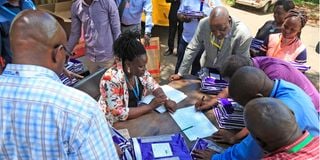
Collection of KCSE examination papers in the past.
The 2024 Kenya Certificate of Secondary Education (KCSE) examinations will start on Tuesday, October 22, with candidates taking practical and oral papers for elective subjects before the common papers for all candidates begin on November 4.
This year’s edition has the highest registered candidature in the history of the KCSE examinations at 965,501, an increase from last year’s 903,138.
Candidates were taken through the rehearsals last Friday. The first to be examined will be candidates for French (oral) German (oral), Kenyan Sign Language (practical signing skills) and music (practical).
The last paper will be physics practical, which will be on November 22, after a month-long exercise to take place in 10,755 centres.
“To ease the collection of KCSE examination papers twice a day, the Kenya National Examinations Council (Knec) has installed an additional 41 containers (distribution centres), increasing the number from a total of 576 to 617,” Knec CEO David Njeng’ere during the launch of the examinations season.
The council will also administer the Kenya Primary School Education Assessment (KPSEA) to learners in Grade Six before they proceed to junior school in January 2025. However, this assessment is not used for placement and transition to Grade Seven is automatic. 1,313,913 candidates have been registered for the assessment that will take place in 32,573 centres, bringing the total candidature this year to 2,279,414.
The assessment will run concurrently with the Kenya Intermediate Level Education Assessment (Kilea) between October 28 and November 1. Kilea is undertaken by learners with disabilities who follow the stage-based curriculum instead of the regular one.
The examination period coincided with the onset of the short rains, posing a challenge to the distribution of materials, especially in remote areas.
“For KPSEA, security officers will only be engaged in the distribution of examination materials to examination centres and return of candidates’ answer sheets to the container. However, for the KCSE exam, the existing practice of having at least two security officers in every centre will be retained,” said Dr Njeng’ere.
Threat to boycott
The examinations will begin under a threat by the Kenya Union of Post Primary Education Teachers (Kuppet) to boycott the exercise if invigilators, supervisors, centre managers and examiners are not paid improved allowances and working conditions.
Marking of the KCSE examinations is scheduled to be completed before the end of December before schools open on January 6, 2025.
An estimated 32,480 teachers are expected to take part in the marking in 40 marking centres.
Knec has also tightened its measures to curb examination malpractices by introducing some new directives.
“All supervisors, invigilators, centre managers and all other personnel involved in the administration of the assessment or examination will be expected to keep their phones in lockable desks under the vigilance of a security officer. The key for the desk shall be kept by the supervisor,” said Dr Njeng’ere.
Meanwhile, the pioneer class of the competency-based curriculum will in January 2025 join Grade Nine, the last class of junior school before transitioning to senior school the following year.
At the end of Grade Nine, learners will undertake the inaugural Kenya Junior School Education Assessment (KJSEA).
“Knec conducted a pilot assessment in 265 sampled schools countrywide, in July 2024. We will be sharing feedback from the KJSEA pilot with stakeholders before the end of this month, together with the sample test papers.
“The feedback on learners’ performance will therefore guide the Ministry of Education to undertake placement of learners in the appropriate pathways and tracks as they transition to senior school,” the Knec boss said.









